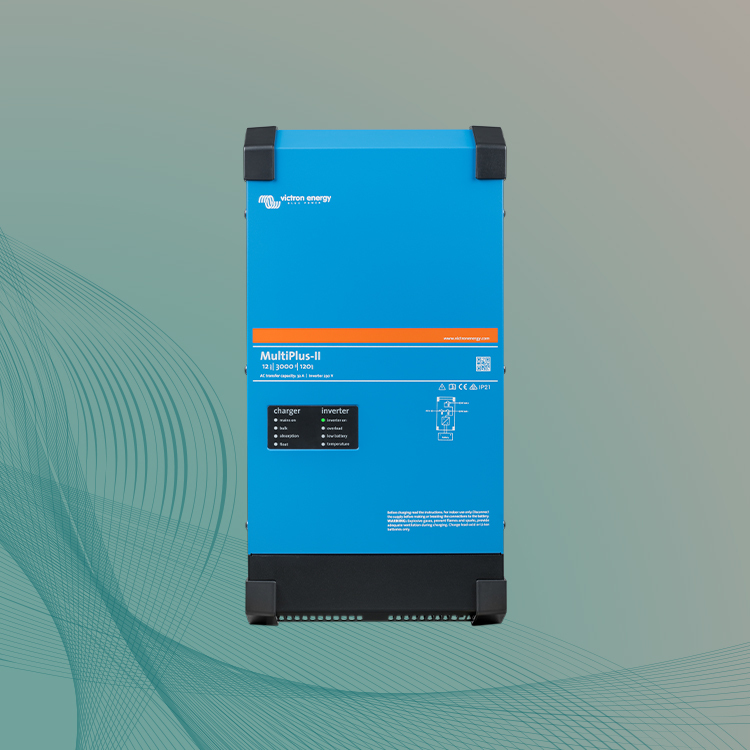


.webp)
.webp)
.webp)
.webp)
What is an inverter/charger?
The Victron MultiPlus-II is a so-called “inverter/charger” – these devices are a subset of hybrid inverters. As such, in addition to converting DC to AC, it can also act as a battery charge controller.
Please note that, unlike the Victron Multi RS Solar 48/6000, this unit does not feature MC4 connectors for solar panel strings or a built in MPP tracking.
For use in photovoltaic installations, this device needs to be paired with a solar charge controller such as the Victron SmartSolar MPPT series.
Second generation product with expanded capabilities
The MultiPlus-II is a multifunctional inverter/charger with all the features of the first generation MultiPlus, and an external current sensor option which extends the PowerControl and PowerAssist functions to 50 A and 100 A, respectively.
What is PowerControl?
This feature allows for a current limit to be set for the grid or generator to prevent overloading them. When the power consumption is under the set limit, any excess energy is used to charge the battery.
What is PowerAssist?
This feature allows the MultiPlus-II to use the battery to supplement the power output in cases where the consumption exceeds the capacity of the grid or generator.
What is the use case for the MultiPlus-II?
The MultiPlus-II is ideally suited for residential applications in homes (including off-grid applications) and small businesses, as well as professional marine, yachting and vehicle use. The device pairs well with batteries such as the Victron Lithium Battery Smart 12,8 V series.
Modular in nature
Up to 6 MultiPlus-II inverters can operate in parallel to achieve higher power output. For example, six 48/5000/70 units will provide 25 kW / 30 kVA output power with 420 A charging capacity. In addition to a parallel connection, three devices of the same model can be configured to output three-phase power. In fact, up to 6 sets of three units can be connected in parallel for a 75 kW / 90 kVA output and more than 1200 A charging capacity.
Instant response
In the event of a grid failure, or when shore or generator power is disconnected, the inverter within the MultiPlus-II is automatically activated and starts supplying AC electricity. This process only takes 20 milliseconds, which allows computers and other sensitive electronic equipment to continue operating without disruption.
Versatile and easy to use
The settings can be changed in a matter of minutes with the VEConfigure software using a computer or laptop and the Victron MK3-USB interface. Multiple monitoring and control options are available from Victron: Cerbo GX, Color Control GX, Venus GX, Octo GX, CANvu GX, a computer, Bluetooth (with the optional VE.Bus Smart Dongle), Battery Monitor and Digital Multi Control Panel. A Cerbo GX or another device from the GX product family can be added to connect the system to the internet.
Local and remote control
When coupled with a controller from the Victron GX family, such as the Cerbo GX, local (LAN) and remote monitoring via the Internet from anywhere in the world is possible. This feature is enabled by the VRM (Victron Remote Management) app and website. Operational data can be stored and displayed the website, free of charge. When connected to the internet, the system can be accessed remotely, and settings can be changed if needed.
Construction and installation
The MultiPlus-II features a sturdy metal enclosure that guarantees safe operation and protects it from damage. The device is designed for indoor wall mounting and comes with the necessary mounting bracket and mounting hardware. It should not be mounted outside and exposed to temperature extremes or water ingress.
Additional safety for grid-connected applications
The MultiPlus-II features built-in anti-islanding functionality for added safety. In case of a grid failure the photovoltaic system will not feed power back into the grid.
For more information, please refer to the technical documentation and manuals provided by the manufacturer, which can be found on this web page.
Inverters are electrical devices that convert DC electricity to AC which is suitable for powering regular household appliances. There are different types of inverters, each with its pros and cons. Among the common inverter types used in photovoltaic systems are grid-tie inverters, microinverters and hybrid inverters. ...
Remarks, reviews & ratings